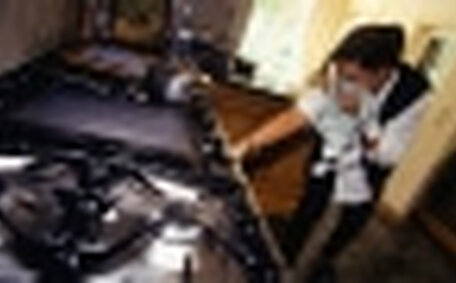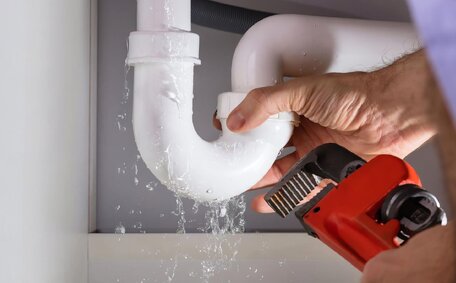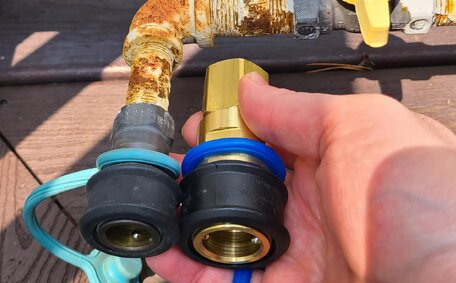Common Causes of Water Waste During Plumbing Issues
Some of the most common plumbing problems leading to excessive water waste include:
- Dripping taps, shower heads, toilet cisterns, and pipe joints can lead to substantial water waste. Even minor leaks add up, negatively impacting water efficiency and leading to potential significant water loss.
- Pipes may burst or supply lines may become compromised due to high pressure or wear and tear, leading to considerable water waste that prompts immediate preventive action.
- Blocked drains - Blocked drains often lead to overflows and flooding, exacerbating water wastage.
- Malfunctioning water heaters - Defective water heaters can steadily leak, wasting litres of water hourly.
- Outdated appliances - Outdated washing machines and dishwashers lacking water-saving features consume more water per cycle than needed.
It’s critical to address such issues without delay by shutting off main water valves, fixing leaks with duct tape, and enlisting a professional plumber for permanent repairs to your pipes and fixtures. Simple habits such as regularly checking for drips and installing water-efficient aerators play a key role in conserving water and reducing usage.
Employing water saving strategies during emergencies can reduce damage, strain on infrastructure, and help save on the high cost of water bills. Resourceful strategies can help minimise water waste from common plumbing issues until they are completely resolved.
Blocked Drains
Blocked drains are major contributors to water wastage and can escalate from minor blockages to disastrous flooding. Food scraps, hair, grease, tree roots and other debris washing down the drain accumulate over time, slowly restricting water flow until nothing can pass through.
A fully clogged kitchen or bathroom drain can cause standing water, which might lead to leaks and overflows, damaging your home. Slow drainage results in using more water, hence not conserving water each time you use a sink or flush, as drainage systems struggle to clear.
Simple steps, such as using minimal water when brushing your teeth, will circumvent plumbing disasters and help prevent blocked drains and the unnecessary use of a lot water:
- Use drain screens and catchers in your drains and showers
- Don’t pour fats/oils down the drain
- Install hair traps
- Limit food waste going down disposal units
- Employ a plunger at initial indicators to prevent plumbing blockages
- Have drains professionally cleaned yearly
Preventing debris build-up with drain screens and regular cleaning protects your plumbing and conserves water that would otherwise be lost clearing blocked pipes. Yearly drain examinations can save hundreds of litres of wasted water and spare you the trouble of critical obstructions that necessitate calling a plumber.
Promptly addressing early signs of a blockage and shutting off water can often clear a clog using simple DIY methods, thereby preventing considerable water loss. But if completely blocked, shut off water immediately and call for emergency plumbing to prevent flooding and water damage.
Broken Pipes and Leaks
Broken pipes and leaks are a major source of water loss and damage in homes. Even minor drips from fixtures, including showerheads, can result in significant water waste over time.
At this rate, a minor shower leak could waste more than 13,000 litres annually.
Halt your water flow immediately by closing off the main valves when detecting pipe damage or leaks, pending professional repairs to your house plumbing. Containing the flow prevents flooding, further infrastructure damage and excess water waste.
The installation of water-efficient aerators and low-flow shower devices trims the water demand, ensuring that leaks and ruptures spill less water pending resolution. Equipping an aerator to a tap can slash its water utilisation by up to 50 per cent, marking a discernible impact. Choosing these fixtures makes good preventative sense.
It’s essential to keep an eye out for leakages and have them remedied swiftly to preserve water and prevent minor issues from escalating into significant piping repairs. Be proactive with plumbing maintenance, don’t ignore leaks!
Taking Immediate Action in a Plumbing Emergency
When faced with a plumbing emergency that threatens to raise your water bill, swift action is critical to prevent catastrophic water damage and lower water usage. As soon as you notice water where it shouldn’t be, follow these steps:
- Locate your home’s main water sources, such as the shutoff valve, to quickly prevent unnecessary water flow. Familiarise yourself with this valve’s location beforehand.
- Turn off power to your water systems, such as heaters and other appliances, if flooding threatens electrical safety.
- Mitigate leaks using any available materials, such as paper towels or duct tape for temporary fixes on burst pipes or cracks, while waiting for professional assistance.
- Position buckets/platters underneath leaky faucets or installations to gather dripping water, preventing it from wastefully circling down the plughole around your home.
- Always turn off taps and refrain from leaving them running, as it only contributes to increased water loss.
- Contact a reliable plumber quickly to make necessary repairs and prevent extensive damage.
Prompt, reasonable measures to cease the water flow diminish hazards to your home’s structure and reduce needless usage from water resources until prevailing troubles receive attention. Advanced preparation - knowing shutoff valve locations and having leak containment supplies on hand - facilitates urgent action during a crisis to curb excessive water waste.
Locating and Stopping Leaks
Swift identification and cessation of leaks are crucial to curtail water usage, ward off excess waste, avert damages, and conserve all your budget allows for utilities. Watch for these common signs of leaks in your plumbing:
- Unexplained increases on water usage which could be costing money your budget didn’t plan for
- Visible water dripping from pipes, valves, fixtures, or appliances
- Damp areas or stains on walls/ceilings
- Low water pressure
- Running toilet that keeps refilling
On detecting a leak, immediately turn off the main water valve to stop the flow and prevent potential excess water charges. Use towels, buckets, and pans to catch dripping water instead of letting it go down drain. Cover cracks and burst pipes with duct tape as a temporary patch until repairs are made.
Ignoring small drippings throughout the year can lead to a cumulative immense waste of water for every household. Catching leaks early prevents this loss plus extensive pipe repairs down the track. Consider proactive leak detection services like pressure testing.
Employ these tips save water to shield crucial water assets and your estate by rigorously scanning plumbing networks and briskly tackling any leaks or moisture. Tiny leaks become hugely wasteful floods if left uncontained.
Maintaining Water Pressure
Maintaining appropriate water pressure between 20 to 80 PSI ensures plumbing efficiency, one of the ways you can ensure your toilet fixtures operate with optimal flow rates. Low water pressure can cause various issues, including:
- Reduced flow rate from taps and your toilet can precipitate frustration and inefficiency
- Toilets flushing slowly or not refilling properly
- Appliances like dishwashers or a poorly operating dual flush toilet can use water inefficiently when they encounter functioning issues due to reduced pressure
- Higher risk of leaks and bursts from excessive strain
Delay running your washing machine or dishwasher until plumbing repairs are complete to ensure a full load, maximising both water and energy efficiency. Prioritise daily usage to drinking, cooking and hygiene needs.
Installing pressure-reducing valves helps regulate pressures above 80 PSI, preventing pipe damage while maintaining effective water flow. Periodically checking your main water metre dial for pressure spikes assists proactive maintenance.
Maintaining balanced water pressure conserves water without sacrificing household functions or plumbing system integrity. Contact a plumber for professional advice maintaining safe pressures.
Innovative Water-Saving Solutions for Urgent Plumbing Issues
During urgent plumbing emergencies, following these plumbing tips with innovative water-saving techniques can make a big difference in minimising waste and damage until repairs are completed:
- Place buckets, pans and towels strategically to catch flowing water instead of letting it pour straight down drains.
- Utilise moisture-absorbing socks filled with rice to soak up minor leaks and drips.
- Temporary installation of faucet aerators with low-flow restrictors can significantly reduce water wastage from taps and water heaters.
- Kill main water supply via the shutoff valve then drain pipes/tanks to contain existing water rather than it leaking out gradually.
- Consider temporary water storage options like portable camping tanks to provide basic needs without wasting tap water unnecessarily.
- Implement water displacement bags or adjustable tank blankets in toilet cisterns for more efficient water use per flush.
Using simple and effective methods to repurpose household items for emergency water containment maintains basic functionality without additional waste until the problem is fixed.
Getting creative with water capture and storage alternatives demonstrates resourcefulness and dedication to water conservation amidst a crisis. Be sure to safeguard health by following safety precautions when improvising temporary plumbing solutions.
Installing Water-Efficient Fixtures
Taking proactive steps can include installing water-efficient plumbing fixtures, an impactful method for reducing household water consumption and pre-empting potential leaks or pipe problems.
Simple upgrades such as low-flow showerheads, tap aerators, and dual flush toilets help keep your own water usage significantly lower compared to standard models. For instance, water-efficient shower head models, with their reduced flow rates, can decrease water consumption to around 6-7 litres per minute compared to 10+ litres used by standard versions.
Since excessive water fixtures hike up plumbing demands, steps can take to mitigate these include swapping them out to lessen strain and drip risks as time goes on. Their lower flow rates also help to keep your water bill in check by curbing potential water loss if bursts or cracks do unexpectedly occur.
During maintenance checks, consider proactive upgrades to your plumbing pipe system with water-saving fixtures. The upfront investment pays dividends through ongoing water savings and enhanced resilience if plumbing emergencies later arise. Potable water is precious - efficient fixtures maximise every drop while preparing households for potential issues.
Using Buckets and Containers to Collect Excess Water
A straightforward method to conserve water during leaks or bursts involves placing buckets, pans, and towels to capture water, your efforts preserving this essential resource instead of wasting it down drains. Use large containers in showers, under taps, and by water heaters to gather excess litres water for reuse like gardening, cleaning, and toilet flushing.
Capturing water during emergencies for purposes like sustaining your plants, held temporarily in baths or sinks, prevents the squandering of precious water while awaiting repairs. Just be sure to carefully monitor makeshift storage methods to prevent new leaks or overflows.
Installing temporary shutoff valves on fixtures and using water catchment containers can greatly optimise the use of running water for essential needs like drinking, hygiene and cooking, without additional wastage. Collected water keeps essentials functioning until repairs can permanently stop flows.
Be creative in repurposing household items to capture every spare drop during plumbing malfunctions. Your ingenuity upholds the integrity of clean water and staves off layered issues related to flood damage from unchecked flows.
How Regular Maintenance Can Prevent Water Emergencies
Carrying out regular plumbing upkeep is paramount to forestall water crises marked by leaks, surges or inundations. Engaging in simple weekly checks like monitoring water usage and checking pipes for wear can protect your family from plumbing disasters by catching small issues early.
Preventative care limits strain on infrastructure so problems are less likely to arise. Quickly fixing minor drips as noticed avoids thousands of litres being wasted annually. Fitting water-saving aerators and reforming habits, such as curtailing shower lengths, also curtails demand, which can help prevent emergencies from arising.
Create a routine plumbing inspection checklist including:
- Metre readings for irregular usage
- Inspecting pipes and valves for drips or cracks
- Testing water pressure
- Clearing drain clogs
Staying vigilant with maintenance lets you address potential plumbing hazards proactively. Invest time upfront and save considerable water and repairs long-term while avoiding emergencies causing unwanted waste and flooding.
When to Call a Professional Plumber
Unchecked plumbing troubles can swiftly intensify, giving rise to flooding crises, water havoc, adverse health environments, and inflated repair invoices, turning into emergencies your household must hastily contend with. While minor leaks or drips from your taps can often be temporarily contained through makeshift methods, more serious emergencies require immediate specialist help.
Reach out to a licenced plumbing authority for support if you confront any issues such as:
- Total lack of water supply to the entire property
- Major pressure loss or intermittent water flow
- Major leaks from burst pipes, your hot water units, or internal appliances
- Backed-up sewer lines with sewage overflow
- Water gas leaks - never attempt DIY fixes on gas plumbing
As your local plumbing company, Gladesville Plumbing, catering to Lake Macquarie and surrounding areas, we’re aptly ready to manage any plumbing disaster with promptness and security. As local plumbing experts since 2000, we are available 24/7 to assess issues and implement emergency repairs to restore function and prevent escalating water wastage or property damage.
For after-hours emergency assistance, call our priority plumbing hotline on 1300 349 338. Or email jobs@gladesvilleplumbingservice.com.au for an urgent consult at your property, potentially within hour. Don’t hesitate – get touch with our expert team for any plumbing needs or advice; we’re here for you!






